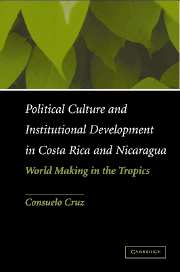 Political Culture and Institutional Development in Costa Rica and Nicaragua
Political Culture and Institutional Development in Costa Rica and Nicaragua Book contents
- Frontmatter
- Contents
- Acknowledgments
- List of Abbreviations
- Chronology
- Political Culture and Institutional Development in Costa Rica and Nicaragua
- Introduction
- 1 Theoretical Overview
- 2 Manichean Identities and Normative Scheming: Origins
- 3 Orphans of Empire: Constructing National Identities
- 4 Postcolonial Paths: Rhetorical Strategies and Frames
- 5 Costa Rica: Possibility Mongers
- 6 Nicaragua: Hybrid Arbitration
- 7 Tropical Histories: Paradise and Hell on Earth
- 8 Transition: Familiar Novelties
- Conclusion
- Index
2 - Manichean Identities and Normative Scheming: Origins
Published online by Cambridge University Press: 20 August 2009
- Frontmatter
- Contents
- Acknowledgments
- List of Abbreviations
- Chronology
- Political Culture and Institutional Development in Costa Rica and Nicaragua
- Introduction
- 1 Theoretical Overview
- 2 Manichean Identities and Normative Scheming: Origins
- 3 Orphans of Empire: Constructing National Identities
- 4 Postcolonial Paths: Rhetorical Strategies and Frames
- 5 Costa Rica: Possibility Mongers
- 6 Nicaragua: Hybrid Arbitration
- 7 Tropical Histories: Paradise and Hell on Earth
- 8 Transition: Familiar Novelties
- Conclusion
- Index
Summary
… language serves to declare what is advantageous and what is the reverse, and it is the peculiarity of man that he alone … possesses a perception of good and evil, of the just and the unjust … and it is association in [a common perception of] these things which makes a family and a polis.
–AristotleIn part because Aristotle was right, polities are at base regimes for the arbitration of contending claims to a wide range of valuable resources, from authority and prestige to access and control of capital and labor. An intuitively appealing view of arbitration regimes posits that their legitimacy ultimately rests on the contenders' conviction that the judges are not self-interested and that the rules are fair. But in fact, these particular strictures need not encumber a legitimate arbitration regime. People may well widely perceive a self-interested arbiter, so long as he or she stands for a greater righteousness, as their rightful judge. Moreover, rules that are just may be repudiated on the basis of their unfair application; and conversely, unjust rules may be accepted if they are perceived to be fairly applied.
In sixteenth century Spanish America, arbitration hinged on the authority of the royal sovereign. The king unabashedly protected the interests of the Crown. But the Crown belonged to the king only because as sovereign he possessed specific, emblematic attributes, such as benevolence, wisdom, and Christian zeal.
- Type
- Chapter
- Information
- Political Culture and Institutional Development in Costa Rica and NicaraguaWorld Making in the Tropics, pp. 46 - 68Publisher: Cambridge University PressPrint publication year: 2005


